
The University of Graz is a public research university located in Graz, Austria. It is the largest and oldest university in Styria, as well as the second-largest and second-oldest university in Austria.

Peter Weibel was an Austrian post-conceptual artist, curator, and new media theoretician. He started out in 1964 as a visual poet, then later moved from the page to the screen within the sense of post-structuralist methodology. His work includes virtual reality and other digital art forms. From 1999 he was the director of the ZKM Center for Art and Media Karlsruhe.

Graz University of Technology is a public research university located in Styria, Austria. It was founded in 1811 by Archduke John of Austria and is the oldest science and technology research and educational institute in Austria. It currently comprises seven faculties and is a public university. It offers 19 bachelor's and 35 master's study programmes across all technology and natural sciences disciplines. Doctoral training is organised in 14 English-speaking doctoral schools. The university has more than 16,000 students, and around 1,800 students graduate every year. The Graz University of Technology and the University of Graz co-operate in teaching and research of natural sciences.
Hyper-encryption is a form of encryption invented by Michael O. Rabin which uses a high-bandwidth source of public random bits, together with a secret key that is shared by only the sender and recipient(s) of the message. It uses the assumptions of Ueli Maurer's bounded-storage model as the basis of its secrecy. Although everyone can see the data, decryption by adversaries without the secret key is still not feasible, because of the space limitations of storing enough data to mount an attack against the system.

Edmund Hlawka was an Austrian mathematician. He was a leading number theorist. Hlawka did most of his work at the Vienna University of Technology. He was also a visiting professor at Princeton University and the Sorbonne. Hlawka died on 19 February 2009 in Vienna.
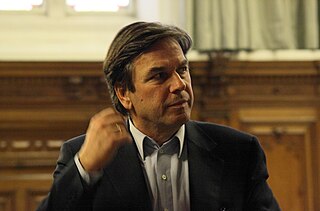
Franz Voves is an Austrian politician of the SPÖ and a former player in the Austrian ice hockey national team. From 25 October 2005 to 16 June 2015 he has been governor of Styria. He was vice-governor of Styria from 12 March 2002 till 24 October 2005. On 2 March 2002 he was elected as the chairman of the SPÖ Styria (Steiermark).

Friedrich Emich was an Austrian chemist. Emich is recognized as the founder of microchemistry and worked at Graz University of Technology. Together with his colleague from the University of Graz, Fritz Pregl he perfected the work in small scales analysis. Fritz Pregl was awarded the Nobel Prize for Chemistry in 1923 for his work on microanalysis.
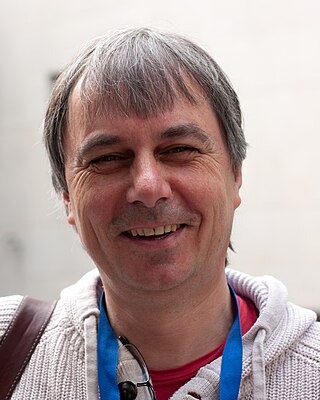
Herbert Edelsbrunner is a computer scientist working in the field of computational geometry, the Arts & Science Professor of Computer Science and Mathematics at Duke University, Professor at the Institute of Science and Technology Austria (ISTA), and the co-founder of Geomagic, Inc. He was the first of only three computer scientists to win the National Science Foundation's Alan T. Waterman Award.
Raimund G. Seidel is a German and Austrian theoretical computer scientist and an expert in computational geometry.
Rainer Ernst Burkard is an Austrian mathematician. His research interests include discrete optimization, graph theory, applied discrete mathematics, and applied number theory.
Emmerich (Emo) Welzl is a computer scientist known for his research in computational geometry. He is a professor in the Institute for Theoretical Computer Science at ETH Zurich in Switzerland.

Klaus Tochtermann is a professor in the Institute for Computer Science at Kiel University and also the director of the ZBW – German National Library of Economics – Leibniz Information Centre for Economics.
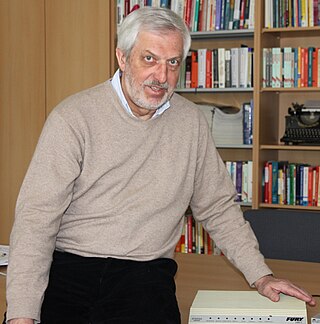
Lutz Michael Wegner is a German computer scientist.

Matthias Josef Maurer is a German ESA astronaut and Materials scientist, who was selected in 2015 to take part in space training.
Franz Aurenhammer is an Austrian computational geometer known for his research in computational geometry on Voronoi diagrams, straight skeletons, and related structures. He is a professor in the Institute for Theoretical Computer Science of Graz University of Technology.
Claudia Draxl is a physicist. She is a full professor at the Humboldt University of Berlin in theoretical condensed-matter physics.

Michael Waidner is a German computer scientist. He is director of the Fraunhofer Institute for Secure Information Technology and ATHENE, the largest research institute for IT security in Europe. He is also professor of security in information technology at the department of computer science of the Technische Universität Darmstadt.
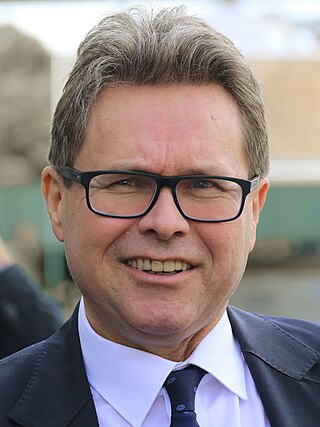
Martin F. Polaschek is an Austrian legal scholar and legal historian who has served as Federal Minister for Education, Science and Research in the Nehammer government since 6 December 2021. An Independent, he was nominated by the Austrian People's Party (ÖVP).
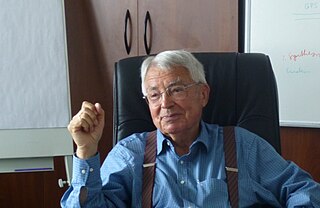
Helmut Moritz was an Austrian physical geodesist. He became internationally known for his fundamental work on error propagation in geodesy. He was a member of the Austrian Academy of Sciences and many other international academies and societies. From 1991 to 1995, he was president of the International Union of Geodesy and Geophysics (IUGG).
Horst Bischof is an Austrian computer scientist and full professor at the Institute of Computer Graphics and Vision (ICG) at Graz University of Technology. Since 1 October 2023, Horst Bischof serves as rector of Graz University of Technology.













